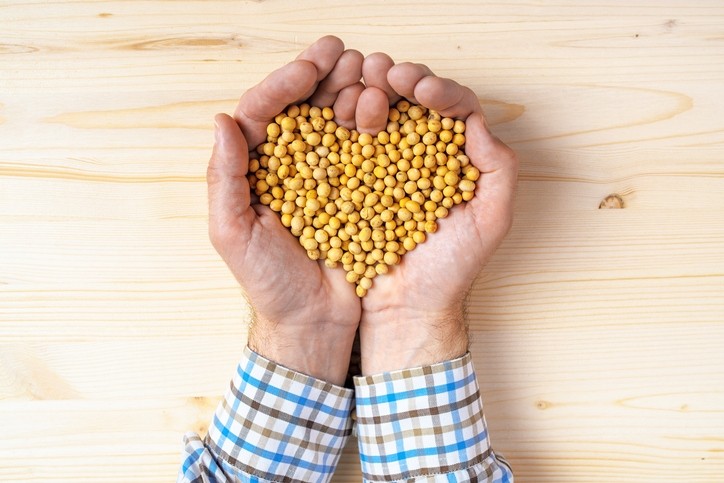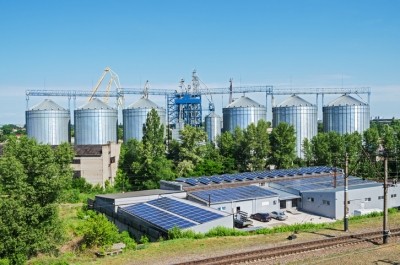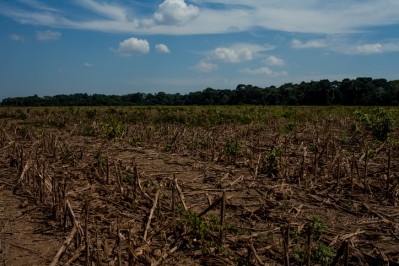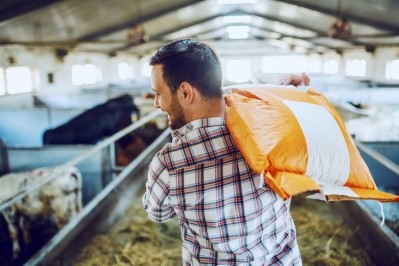Platform aims to increase UK’s supplies of sustainable soy

Launched last year, in March 2018, the UKRT is facilitated by EFECA, a group of experts providing advice on the sustainable and legal sourcing of natural resources, with a focus on agricultural and forest commodities.
We talked to Jonathan Gorman, technical director, EFECA, to hear why there was a need for such a platform in the UK, and to get a sense of its achievements to date.
There were a number of drivers that prompted the setting up of the Roundtable in the UK, he said.
In terms of commitments that needed practical action plans, UK companies recognized that it might be better to hook up in order to achieve greater headway, explained Gorman.
“A number of leading UK companies had already committed to eliminating deforestation within their supply chains including on soy, but wanted to work together with others in a similar position, to accelerate progress.”
Current position of UK imports, consumption and sustainability
The UK, according to the EFECA baseline report, mostly uses soy in the form of soymeal, which is most commonly used in animal feed. The total volume of soy consumed in the UK is estimated to be 3.8m ton of soybean equivalents - this includes 3.1m tons of direct imports and at least 700,000 tons of soy embedded in other imports such as meat products.
The proportion of UK soy estimated to be from a ‘sustainable’ source is around 30%, though it could be as high as 60%, as per the EFECA publication. This variation is likely due to where in the supply chain soya scheme credits are purchased, and more work is being done to better understand reporting, said the authors.
Due to the complexities of the supply chain, it is not currently possible to calculate the proportion of soy used in each animal sector using publicly available data, they continued. However, this may be possible for members within their individual supply chains, they said.
According to USDA reports, on average one hectare of land can produce 3 tons of soy. Taking the figure of 3.8m tons of soy outlined above, this would therefore equate to 1.3m hectares of land to produce the soy consumed in the UK.
Source: EFECA baseline report, October 2018
In the background was increasing awareness of soy expansion, in biomes like the Cerrado.
The publication of the Cerrado Manifesto and, subsequently, the food and retail industry supported SOS Cerrado Manifesto highlighted the speed and the extent of forest and native vegetation loss resulting from soy and cattle expansion and called for immediate action by government, buyers and investors to protect the Brazilian Cerrado.
“The manifestos raised the profile of soy in the commodities sector. Commodities like palm oil have been very high profile for many years, and, perhaps, soy has been slightly [under the radar].”
It was industry that initially approached the UK government, seeking its assistance in convening a wider group across the supply chain, to pick up the pace:
“There was an absolute willingness on behalf of the government to say yes. It made sense. There was work already underway [in this area] through the UK Department for International Development (DFID) funded program, Partnerships for Forests. The UK government is also a signatory to the New York Declaration on Forests (2014) and to the Amsterdam Declarations on deforestation (2015), so it was already committed to helping the private sector achieve their commodity supply chain pledges.”
The stage was set then.
“Soy is such a massive commodity, so however big a player you are in the UK or in any country, you do need to act together, it is too critical and vital [an issue] for companies not to work together.”
“The UK Roundtable on Sustainable Soy fosters exactly the kind of collaborative and constructive conversations that are needed to accelerate progress on sustainable soy."
Jemima Jewell, partner and sustainable sourcing manager, Waitrose.
Recruitment, collaboration
In the build up to the establishment of the UK Roundtable, there were a number of actions carried out:
“One was to recruit as many of the major actors on soy in the UK, to make sure we had really good representation from traders right through to the major retailers.
“Another one was to reach out, to engage all of those initiatives, organizations and platforms that were already working in this space, including all the certification bodies, but also others, such as those working on definitions and standards, for example, and to link up to all of those groups. While we wanted to act then as a kind of hub, we also wanted to make sure we did not duplicate any work they were doing.
“Instead of sitting and looking inwardly for the next five years, and thinking what does sustainable soy mean, we will go and find those people that are working on those definitions, and we will go and find the people working on certifications.
“A third action [taken in the build-up period] was engagement with other national initiatives, those that were already up and running or thinking about it. The Dutch have had a similar initiative for a number of years, so we went straight to them and asked how they set it up, how they set their goals. We also spoke to the Danes, the French, the Swedes, the Swiss, and the Germans; they are all at different stages.”
The Dutch are excited about the UK initiative:
“I think the Dutch are quite encouraged by the UKRT. One of the [obstacles the Dutch Soy Coalition hit] was that, having dealt with and made fantastic progress on the soy they consume within the Netherlands, as a net exporter of soy, they realized that, without the pull from markets like the UK and others asking for similar standards, they could only go so far [on their responsible soy sourcing commitments].”
The UK Roundtable team has also met with their Chinese counterparts:
“We were very keen to engage with the China Sustainable Soy Trade Platform. We had two or three meetings with them; we shared our goals, trying to make sure we can align our messaging.”
Time-bound plans
In terms of the goals of the UK platform, he said the membership wanted to be action orientated, to take practical steps in the short-term:
“We recognize that we don’t have all the answers on soy. To get to true, long-term environmental and social sustainability that works from the farmer in South America all the way to the retailer in the UK takes time. But there are things you can do now.”
The Roundtable signatories have committed to soy that is legal and cultivated in a way that protects against conversion of forests and valuable native vegetation. Within that goal, there are two immediate milestones for members to achieve:
“One of [those targets] is that members would commit to publishing time-bound plans, to achieve this goal, by the end of April 2019. That was deliberate, as every company is different and it might take some time, beyond 2020, to complete this goal. However, we wanted to establish a strong market signal of ‘as soon as possible’ so the deforestation commitments that producers in South America see if not yet actual demand are converted into action-bound, time-bound plans. That April timeline was really important.”
He believes the UKRT was instrumental in ensuring three of the major UK retailers – Tesco Lidl and Asda – published their time-bound plans in the public domain last year and all three are starting to purchase sustainable soy through credits.
“That is only the start of the journey but, hopefully, it begins to builds that kind of confidence that we are not just about setting more long-term goals; that we are going to set a goal that has practical, short-term actions. If you take action now and [can show] that supply chain actors, the UK retailers and others, are beginning to invest in sustainable soy, and are not just about commitments, then you build the space [needed] to have longer-term discussions.”
The other target the UKRT members have to meet is to make meaningful and demonstrable progress towards the goal of protecting forests, and valuable native vegetation by 2020.
“2020 is a really important milestone, we did not want to lose it, but we also recognized that some companies’ plans towards sustainable soy are going to extend beyond 2020. So if a company has a plan that it put out by the end of April this year, and it decides that the biggest footprint of its business is in either poultry or in pork or in milk, the company needs to show it has make meaningful progress towards that by 2020, according to its plan.”
Those two milestones should get companies out of the starting blocks quite quickly and enable supply chain players to have critical conversations over a relatively short period of time, said Gorman.
“With those combined conversations comes confidence to act. No one wants to act first, but if we are all acting together, it reduces some of those risks, and I think we are seeing some of that. We don’t want plans that stretch for 10 to 20 years, we want members to set their plans out and demonstrate that they are making progress.”
James McCulloch, head of feed sector, Agricultural Industries Confederation (AIC), said that trade group considers the UKRT to be of benefit to the entire soy supply chain in providing a valuable forum for the exchange of views and information surrounding sustainable soy.
"AIC supports the Roundtable in its aims to encourage a mass market move to secure, resilient supplies of sustainable soy to the UK and will continue to promote and recommend the use of the FEFAC Soy Sourcing Guidelines to all Roundtable members interested in developing a sustainable soy policy."
Monitoring progress
The way that the UKRT holds itself to account is that it monitors progress through reports. It published its baseline report in October 2018.
“Next year we will be measuring progress again; transparency is an important motivator here. The bright light of day always help to motivate us, and if time-bound plans are in the public domain, everybody can see what you have committed to and also we learn from each other [that way].
“Those are just some of the mechanisms that we [have put in place to encourage] practical action. Of course, one of the other ways we are doing that is building these allegiances and alliances with other initiatives that are doing the same thing. The more you build the volumes and the more leverage you've got, not just in the UK but across the whole of Europe and in China, the greater I think there is the chance that it will be seen as meaningful, and will be seen as a single message that we want to support long-term sustainable soy production.”
'Important starting point'
Certification, by way of credits or purchasing mass balance soy, is a way of doing something right now, he argues.
“We have three retailers willing to buy certified soy and that is an important starting point.
“There are underlying issues in places like the Cerrado - there is a feeling that we need to go beyond the protection afforded by the law in Brazil but, to do that, farmers absolutely need an incentive to avoid converting land that is legally theirs to convert. There are many discussions going on, for example, in the Cerrado Working Group, about how those mechanisms could work. We can support those conversations, and members can support those conversations, they will take a little longer to play out, but that does not mean we do nothing in the meantime. We can do something, every ton a company buys that is certified is sending back a message, a signal [to the farmers].”
Every sector has a way in which they try to build the demand, the volumes and build the supply, he said.
“The same happened in palm oil, where it was all book and claim, credits to begin with. You could argue that, in soy, the RTRS has been building that supply for a long time and companies have not being buying it in the volumes that had been anticipated. The UK can [now address that] - that volume has been built, and we have sent the signal out to farmers that produced it that we are going to buy it. It is not the end of the journey, but it is an important way to show we are going to turn commitments into practical actions. You have to build the confidence of those supplying it that sustainable soy is required. Certification is an important step towards that.”
Indeed, while only 1-2% of global soy production is certified responsible, RTRS president, Marina Engels, told FeedNavigator in December 2017, that figure could jump to 10% in five years if demand for credits and produce increases.
Gorman added that the idea of the UK Roundtable is to help members to work within their own supply chains but also to step out of their supply chains, and to ask what is required to transform the industry: “It is not just about individual certified supply chains. We need to work on both levels, and [as is practically possible] at the same time.”














